Comprehensive Guide to Garden Maintenance in Richmond
Introduction to Garden Maintenance

Maintaining a beautiful garden in Richmond requires dedication, knowledge, and the right set of tools. Whether you're a seasoned gardener or a beginner, understanding the essential aspects of garden maintenance can transform your outdoor space into a lush, vibrant oasis.
Garden maintenance involves a series of tasks that ensure your plants thrive, your garden remains aesthetically pleasing, and any potential issues are addressed promptly. From soil preparation to pest control, each step plays a crucial role in the overall health of your garden.
In Richmond, the climate and local flora present unique challenges and opportunities for gardeners. By tailoring your maintenance practices to the specific conditions of the region, you can achieve a garden that not only survives but flourishes.
Seasonal Garden Maintenance Tasks

Seasonal changes significantly impact garden maintenance routines. Adapting your gardening practices to the seasons ensures that your plants receive the appropriate care they need throughout the year.
Spring Maintenance
Spring is a crucial time for garden maintenance. As temperatures rise, plants begin to grow rapidly, and it's essential to prepare your garden for the upcoming growing season.
- Soil Preparation: Test and amend the soil to provide the necessary nutrients for plant growth.
- Pruning: Trim dead or overgrown branches to promote healthy growth.
- Planting: Introduce new plants and perennials to ensure a diverse and thriving garden.
Essential Tools for Garden Maintenance
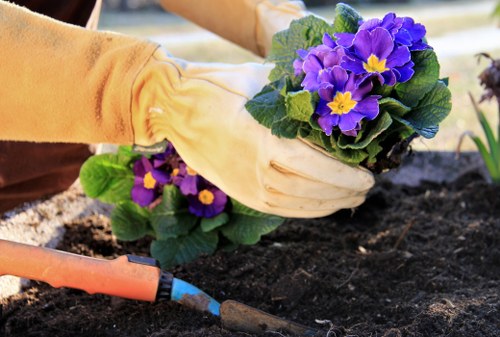
Having the right tools is vital for effective garden maintenance. Equipped with the proper tools, you can perform tasks efficiently and reduce the physical strain associated with gardening.
Basic Gardening Tools
- Pruning Shears: Ideal for trimming and shaping plants.
- Garden Fork: Useful for aerating soil and removing weeds.
- Watering Can or Hose: Ensures plants receive adequate moisture.
- Gloves: Protect your hands from thorns, dirt, and other garden hazards.
- Wheelbarrow: Facilitates the transportation of soil, compost, and other materials.
Soil Care and Fertilization
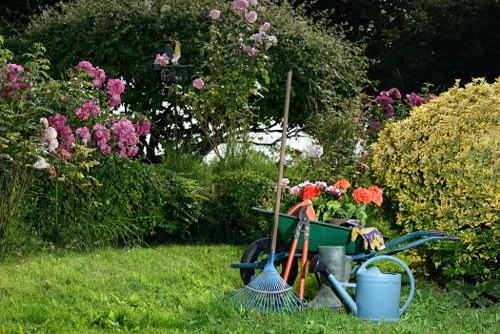
The foundation of a healthy garden lies in the quality of its soil. Proper soil care and fertilization provide essential nutrients that plants need to grow strong and resist diseases.
Soil Testing
Conducting regular soil tests helps determine the pH levels and nutrient content, allowing you to make informed decisions about soil amendments.
Organic Fertilizers
- Compost: Enhances soil structure and provides a slow release of nutrients.
- Manure: A natural fertilizer that improves soil fertility.
- Bone Meal: Supplies phosphorus for root development.
In Richmond's climate, balancing soil moisture is crucial. Implementing mulching practices can help retain soil moisture, regulate temperature, and suppress weed growth.
Pest and Disease Management
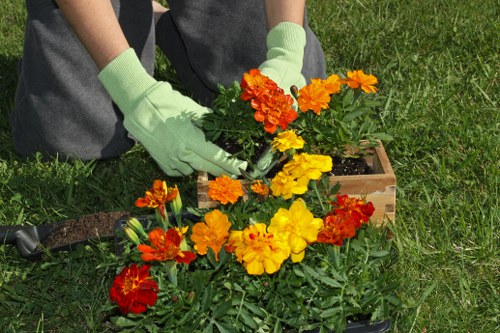
Protecting your garden from pests and diseases is a significant aspect of maintenance. Early detection and effective management strategies can prevent extensive damage to your plants.
Integrated Pest Management (IPM)
IPM combines biological, cultural, and chemical methods to manage pests sustainably. It emphasizes monitoring pest populations and using targeted interventions when necessary.
- Biological Controls: Introducing beneficial insects that prey on garden pests.
- Cultural Practices: Rotating crops and maintaining plant health to reduce susceptibility.
- Chemical Controls: Using eco-friendly pesticides as a last resort.
Common Garden Pests in Richmond
- Aphids
- Slugs and Snails
- Spider Mites
- Japanese Beetles
- Powdery Mildew
Implementing preventive measures and regular monitoring can significantly reduce the impact of these pests and ensure a thriving garden.
Lawn Care and Maintenance
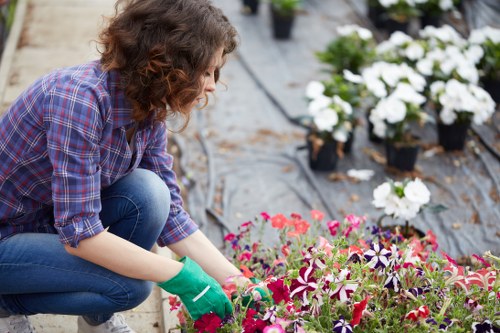
A well-maintained lawn enhances the overall appearance of your garden. Proper lawn care involves mowing, watering, fertilizing, and addressing common lawn issues.
Mowing Techniques
Regular mowing promotes healthy grass growth. It's essential to mow at the correct height to encourage deep root development and prevent weed invasion.
Irrigation Practices
- Deep Watering: Encourages roots to grow deeper, enhancing drought resistance.
- Morning Watering: Reduces the risk of fungal diseases by allowing grass to dry during the day.
- Proper Scheduling: Adjusting watering frequency based on seasonal changes ensures optimal moisture levels.
Fertilization Strategies
Applying the right type of fertilizer at appropriate intervals provides essential nutrients, promoting a lush and green lawn.
In Richmond, selecting grass varieties that are well-suited to the local climate can reduce maintenance efforts and improve lawn resilience.
Pruning and Trimming Techniques
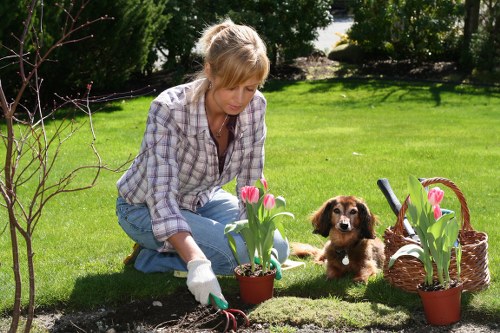
Pruning and trimming are vital for maintaining the shape, health, and productivity of your plants. Proper techniques ensure that your garden remains tidy and that plants can flourish.
When to Prune
Different plants require pruning at specific times of the year. Understanding the growth cycles of your plants aids in determining the optimal pruning schedule.
Pruning Tools and Methods
- Hand Pruners: Suitable for small branches and delicate plants.
- Pruning Saws: Ideal for larger branches that require more force.
- Shears: Perfect for trimming hedges and shaping shrubs.
Implementing proper pruning techniques can enhance air circulation, reduce disease risk, and stimulate new growth.
Weed Control and Management
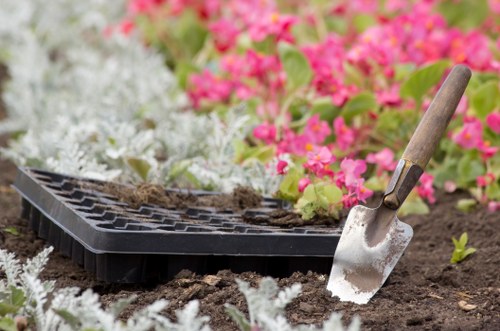
Weeds compete with your garden plants for nutrients, light, and water. Effective weed control is essential to maintain the health and appearance of your garden.
Manual Weed Removal
Hand-pulling weeds is a labor-intensive but effective method, especially for small gardens. Ensuring the complete removal of the root prevents regrowth.
Mulching for Weed Suppression
- Types of Mulch: Organic mulches like bark, straw, and compost can suppress weeds while enriching the soil.
- Application Techniques: Applying a 2-3 inch layer of mulch around plants and garden beds reduces weed emergence.
Herbicide Use
When manual methods are insufficient, using eco-friendly herbicides can help manage persistent weeds without harming desirable plants.
Watering Strategies for a Healthy Garden

Proper watering is fundamental to garden maintenance. It ensures that plants receive the necessary hydration to grow and thrive.
Understanding Plant Water Needs
Different plants have varying water requirements. Understanding the specific needs of each plant type prevents over or under-watering.
Efficient Irrigation Systems
- Drip Irrigation: Delivers water directly to the plant roots, minimizing water wastage.
- Sprinkler Systems: Suitable for larger garden areas, providing even water distribution.
- Automatic Timers: Ensure consistent watering schedules without manual intervention.
Rainwater Harvesting
Collecting and utilizing rainwater is an eco-friendly way to water your garden, reducing dependency on municipal water sources and lowering utility costs.
Mulching: Benefits and Techniques
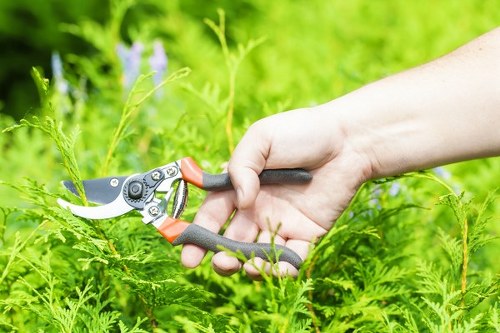
Mulching is a versatile garden maintenance practice that offers numerous benefits, including moisture retention, temperature regulation, and weed suppression.
Types of Mulch
- Organic Mulch: Materials like wood chips, straw, and compost enhance soil fertility as they decompose.
- Inorganic Mulch: Options such as gravel, rubber, and landscape fabric provide long-lasting weed control without altering soil nutrients.
Application Tips
Applying mulch at the correct depth (typically 2-3 inches) and maintaining it regularly ensures maximum benefits and prevents issues like mold growth.
Seasonal Mulching
Adjusting mulch types and application times based on the season can optimize plant protection and soil health throughout the year.
Composting for a Sustainable Garden
[IMG_11]Composting transforms kitchen scraps and garden waste into valuable organic matter, enriching your garden soil and reducing landfill waste.
Setting Up a Compost Bin
Choose a suitable location for your compost bin, ensuring it has proper ventilation and drainage to facilitate decomposition.
Composting Materials
- Green Materials: Kitchen vegetable scraps, grass clippings, and fresh plant waste provide nitrogen.
- Brown Materials: Dried leaves, straw, and cardboard offer carbon for the composting process.
Maintenance and Tips
Regularly turning the compost, maintaining moisture levels, and balancing green and brown materials accelerate the decomposition process and produce rich compost for your garden.
Plant Selection and Placement
[IMG_12]Choosing the right plants and placing them appropriately within your garden layout are critical for successful garden maintenance. Proper selection enhances biodiversity, aesthetic appeal, and plant health.
Understanding Richmond’s Climate
Richmond's climate, characterized by hot summers and mild winters, influences the types of plants that can thrive. Selecting plants adapted to these conditions reduces maintenance efforts and increases garden resilience.
Plant Diversity
- Perennials: Provide long-term structure and reduce the need for annual replanting.
- Seasonal Flowers: Add color and variety, ensuring your garden remains vibrant throughout the year.
- Native Plants: Adapted to local conditions, requiring less water and care.
Strategic Plant Placement
Organizing plants based on their light and water requirements optimizes growth and minimizes competition for resources. Grouping plants with similar needs simplifies maintenance and enhances garden harmony.
Practical Garden Design Tips
[IMG_13]A well-designed garden balances aesthetics with functionality. Thoughtful planning ensures that maintenance tasks are manageable and that the garden remains an inviting space.
Creating Functional Zones
Divide your garden into zones based on usage, such as vegetable patches, flower beds, seating areas, and pathways. This organization facilitates targeted maintenance and enhances the garden's overall structure.
Incorporating Hardscaping Elements
- Paths and Walkways: Improve accessibility and add visual interest.
- Fencing and Borders: Define spaces and provide support for climbing plants.
- Outdoor Structures: Incorporate pergolas, benches, and trellises to create focal points.
Choosing the Right Materials
Select materials that complement your garden's style and are durable against Richmond's weather conditions. Sustainable and low-maintenance options reduce long-term upkeep efforts.
Sustainable Gardening Practices
[IMG_14]Adopting sustainable gardening practices not only benefits the environment but also contributes to the long-term health and beauty of your garden.
Water Conservation
Implementing efficient watering techniques and selecting drought-resistant plants helps conserve water, a valuable resource in Richmond's climate.
Organic Gardening
- Natural Fertilizers: Use compost and manure to enhance soil fertility without chemical additives.
- Biological Pest Control: Encourage beneficial insects that naturally manage pest populations.
- Crop Rotation: Prevent soil depletion and reduce disease risk by varying plant types each season.
Recycling and Repurposing
Reuse garden materials and repurpose household items to create unique garden features, reducing waste and promoting creativity.
Dealing with Common Garden Challenges
[IMG_15]Every garden faces its unique set of challenges. Identifying and addressing these issues promptly ensures that your garden remains healthy and inviting.
Weed Infestation
Consistent weeding and preventive measures like mulching can control weed growth and protect your plants from competition.
Soil Erosion
- Ground Cover Plants: Planting low-growing species stabilizes the soil.
- Terracing: Create terraces on slopes to reduce runoff and soil loss.
- Retaining Walls: Provide structural support and prevent erosion in vulnerable areas.
Pest Resistance
Develop a diverse garden with a variety of plants to naturally deter pests and reduce the likelihood of infestations.
Maintaining Garden Tools and Equipment
[IMG_16]Proper maintenance of your garden tools and equipment extends their lifespan and ensures their effectiveness in garden tasks.
Regular Cleaning
After each use, clean tools to remove dirt and debris, preventing rust and deterioration.
Sharpening and Repairs
- Sharpen Blades: Keep cutting tools sharp for efficient pruning and trimming.
- Lubricate Moving Parts: Ensure smooth operation of tools with hinges and joints.
- Storage: Store tools in a dry, secure place to protect them from weather damage and theft.
Upgrading Equipment
Invest in high-quality tools that suit your gardening needs and reduce the physical strain associated with maintenance tasks.
Expert Tips for Efficient Garden Maintenance
[IMG_17]Maximizing the efficiency of your garden maintenance efforts can lead to better results with less time and energy spent.
Plan Ahead
Develop a seasonal maintenance schedule to stay organized and ensure that no essential tasks are overlooked.
Use Companion Planting
- Enhance Growth: Certain plant combinations can promote mutual growth and health.
- Pest Deterrence: Some plants naturally repel pests, reducing the need for chemical interventions.
- Space Optimization: Efficiently use garden space by pairing plants with complementary growth habits.
Embrace Technology
Utilize gardening apps and tools to track plant growth, schedule maintenance tasks, and receive expert advice tailored to Richmond's climate.
Conclusion
Effective garden maintenance in Richmond involves a blend of knowledge, planning, and consistent effort. By understanding the local climate, selecting appropriate plants, and implementing sustainable practices, you can cultivate a garden that is both beautiful and resilient.
Embark on your gardening journey with confidence, and watch your Richmond garden thrive year-round.
Contact us today to schedule a consultation and start transforming your garden into the paradise you've always envisioned.
